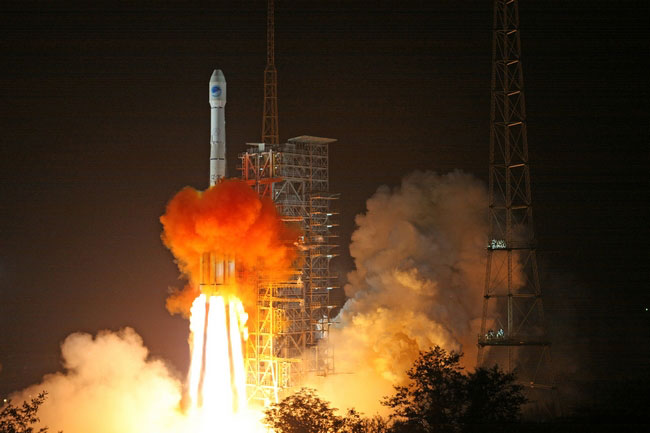
China has switched on its own satellite navigation system, marking a big step forward for a nation eager to reduce its reliance on the West for key strategic technologies.
The Beidou system — whose name translates as "Big Dipper" — began providing positioning and navigation services on Tuesday (Dec. 27), according to state news reports. The emergence of Beidou should make China far less dependent on the GPS constellation, which is operated by the United States military and is currently the world's dominant satellite navigation network.
"Countries build their own systems because owning an independent satellite navigation system is important to economic development and national security," said Pang Zhihao, deputy editor-in-chief of the publication Space International, according to the newspaper China Daily.
The initiation of Beidou follows closely on the heels of another Chinese space milestone. In November, the nation successfully docked two robotic spacecraft in Earth orbit, a key step in its quest to have a manned space station up and running by 2020.
Beidou currently consists of 10 satellites and covers a swath of the Asia-Pacific region from Australia in the south to Russia in the north. The system is accurate to within 82 feet (25 meters) and now serves China and surrounding areas on a pilot basis.
But those specs will all change. China plans to expand the satellite constellation and its coverage, making Beidou a truly global system. Six more satellites are due to launch next year, and the nation envisions having 35 in the constellation by 2020, according to China Daily.
Beidou's performance will improve as the constellation grows. The system should be able to pinpoint locations to within 33 feet (10 m) when the six additional satellites are lofted in 2012, officials said.
Get the Space.com Newsletter
Breaking space news, the latest updates on rocket launches, skywatching events and more!
China now joins the U.S. and Russia as the only nations to have operational homegrown satnav systems. Europe is also developing its own network, called Galileo, which is slated to start offering some services in 2014 and become fully operational in 2020.
Beidou began taking shape in 2000, when the first satellites for an experimental version of the network were launched. Beidou is designed to be compatible and interoperable with other satnav systems, Chinese officials have said.
The United States' GPS system currently relies on 24 satellites. It became fully operational in 1994.
You can follow SPACE.com senior writer Mike Wall on Twitter: @michaeldwall. Follow SPACE.com for the latest in space science and exploration news on Twitter @Spacedotcom and on Facebook.
Join our Space Forums to keep talking space on the latest missions, night sky and more! And if you have a news tip, correction or comment, let us know at: community@space.com.

Michael Wall is a Senior Space Writer with Space.com and joined the team in 2010. He primarily covers exoplanets, spaceflight and military space, but has been known to dabble in the space art beat. His book about the search for alien life, "Out There," was published on Nov. 13, 2018. Before becoming a science writer, Michael worked as a herpetologist and wildlife biologist. He has a Ph.D. in evolutionary biology from the University of Sydney, Australia, a bachelor's degree from the University of Arizona, and a graduate certificate in science writing from the University of California, Santa Cruz. To find out what his latest project is, you can follow Michael on Twitter.









